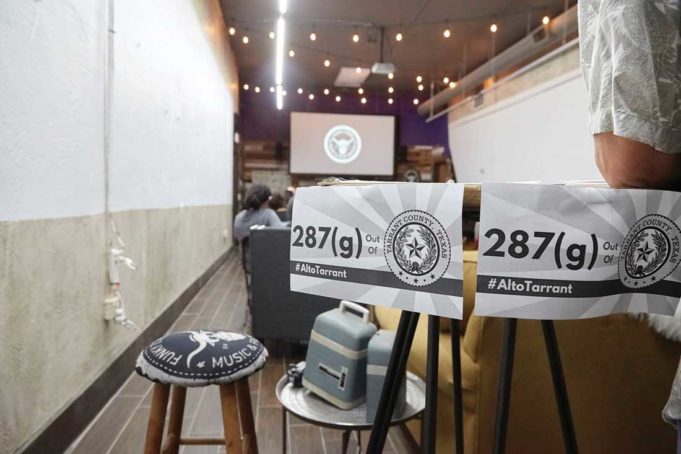Around 45 people gathered in a classroom at Texas Wesleyan University’s Martin Hall recently to talk about 287(g).
The first order of business: What is 287(g)? Guest speakers from the immigrant and refugee advocacy nonprofit RAICES volunteered to discuss the new agreement between Immigration and Customs Enforcement (ICE) and Tarrant County sheriffs. Its roots date back to July, when officials from ICE announced an agreement with 18 Texas counties to allow a limited number of county jail officers –– including Tarrant’s –– to be trained by ICE agents.
David McClelland, spokesperson for the Tarrant County sheriff’s department, said the agreement allows for greater local control over immigration issues, which means the interrogation of suspected undocumented individuals can be handled without ICE agents present.
But many leaders in the Hispanic community see 287(g) as yet another attempt to marginalize Latinos, especially in light of the controversial state bill SB 4, which allows peace officers to question the immigration status of anyone they lawfully detain.
Daniel Rodriguez, co-founder of United Fort Worth, a civil rights-minded grassroots group, said Latino immigrants, legal and undocumented, are often reluctant to report cases of racial profiling for fear their immigration status will be questioned. United Fort Worth members are taking steps to raise awareness of 287(g) — the group aims to repeal the agreement through Tarrant County Commissioners Court, the five-member governing body of Tarrant County. Last week, Rodriguez and Juana Guzman, legal assistant with RAICES, met with Commissioner Roy Brooks.
During the conversation, Rodriguez said he was told by Brooks that the commissioners court has the authority to revoke the agreement but that that would be unlikely given the conservative leanings of many of the commissioners. I reached out to Brooks but did not hear back by the time this article went to print.
The new relationship between the county sheriff’s office and ICE has raised questions from the newly formed Task Force on Race and Culture. The Fort Worth City Council-appointed advisory panel, according to city human relations coordinator Veronica Villegas, recently asked the Tarrant County sheriff’s department to clarify how detainees without legal immigration status will be processed at the city jail before being transferred into county custody. The taskforce’s concern is that city and county peace officers may have different policies. The sheriff’s department has been asked to give a presentation at the taskforce’s next public meeting, Monday, Oct. 18, from 5 p.m. to 6 p.m. at the Deborah Beggs Moncrief Garden Center, near the Cultural District.
Bob Ray Sanders, taskforce co-chairman and longtime civil rights advocate and journalist, told me that a newly formed sub-committee within the taskforce will likely explore the impact that 287(g) is having on the Fort Worth community.
Emphasizing that his opinions do not reflect the thoughts of the taskforce, he added that the county agreement appears to be more about “political posturing” than public safety.
“We already have a police force and sheriff’s department who do their jobs,” he said. “To make any of those an arm of ICE is ridiculous. It’s more of a political move than anything else.”
McClelland from the sheriff’s department maintains that anyone in custody with a Texas ID is “presumed” to be here legally.
The deal with ICE reflects a nationwide trend toward domestic immigration enforcement. A new report released by the U.S. Department of Homeland Security highlights two trends that many local immigrant advocates find worrisome. While the number of people arrested while crossing the U.S.-Mexico border has reached its lowest point since 1971, immigration-related arrests within the United States have increased by 25 percent, the report said.
“Why did Tarrant County even do this?” Rodriguez asked, referring to the 287(g) agreement. “Historically, [Tarrant County] isn’t known for having strong rhetoric against the undocumented community. We have seen a shift with this new [president’s] administration.”
President Trump has followed his pre-election claim that Mexicans immigrants are “rapists” and criminals with a slew of policy changes targeted toward immigrants and refugees. During his first month in office, Trump asked the U.S. Department of Homeland Security, which oversees ICE, to enter into more 287(g) agreements through an executive order. Last September, Trump ended the Deferred Action for Childhood Arrivals (DACA) program, leaving several hundred thousand undocumented, largely Hispanic residents in fear of deportation. The president has consistently threatened and lambasted so-called sanctuary cities that resist his hardline approach to immigration.
The Fort Worth community can expect to see a mass mobilization effort to confront 287(g), Rodriguez added. Last August, around 500 protesters marched through several blocks of downtown Fort Worth in protest of SB 4 under the guidance of United Fort Worth.
“It’s important to speak out,” he said. “We will be mobilizing en masse.”












